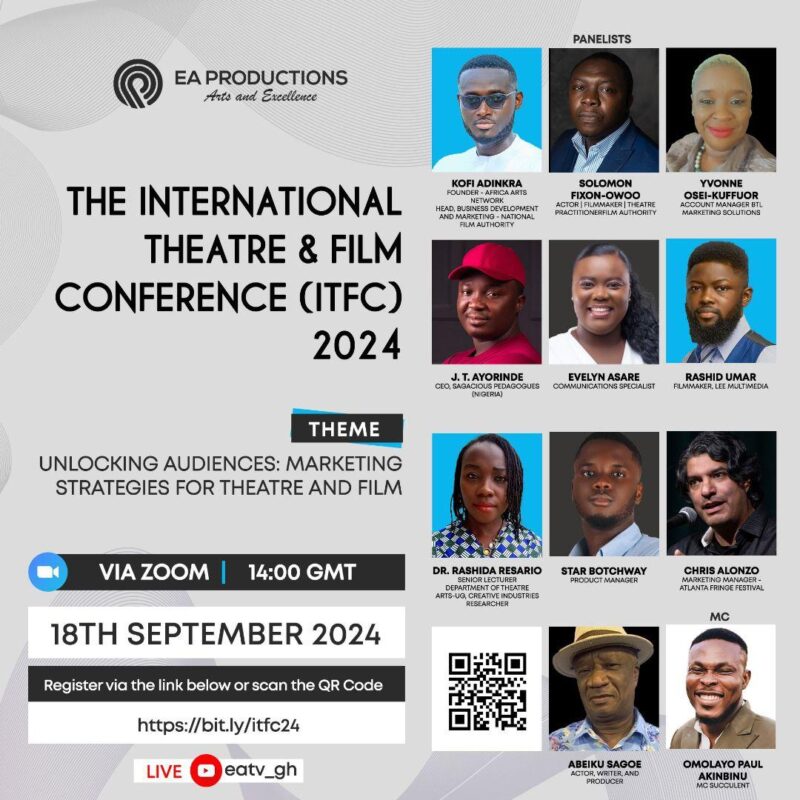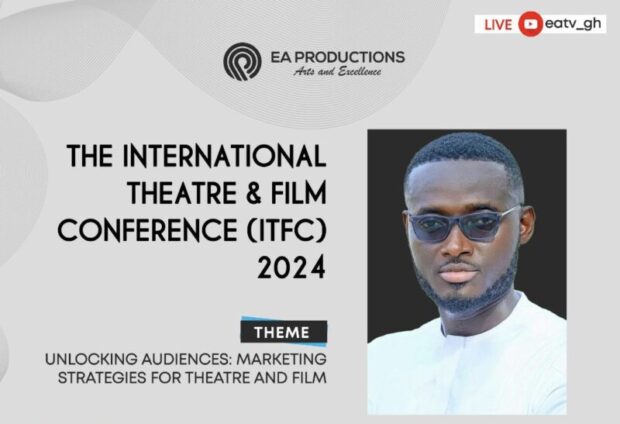
Audio By Carbonatix
The International Theatre and Film Conference (ITFC) 2024 was an inspiring and insightful gathering of creative professionals, industry leaders, and marketing experts.
Held virtually, the conference centred on the theme, "Unlocking Audiences: Marketing Strategies for Theatre and Film," and highlighted how marketing can play a transformative role in the success of both industries.
Kofi Adinkra, founder of Africa Arts Network and Head of Business Development and Marketing at the National Film Authority, delivered the keynote address. Kofi’s dual perspective, as both a regulator and a private theatre practitioner, added an enriching layer to the discussion. His address, titled "Unlocking Audiences: Marketing Strategies for Theatre and Film," provided actionable insights into audience engagement strategies tailored for the digital age.
The Distinction Between Theatre and Film
In his address, Kofi acknowledged the inherent differences between theatre and film in terms of their production and consumption. Theatre thrives on live, immediate interaction between the stage and the audience, creating an intimate and ephemeral connection. Film, on the other hand, is a more scalable medium that can reach millions and continue to engage audiences long after its release.
Kofi pointed out that, while both industries aim to connect with audiences through storytelling, the marketing strategies for each must be tailored to their unique dynamics. Effective marketing is not only about promoting a product but also about building lasting connections between the art and the audience.
The Crucial Role of Marketing in Theatre and Film
Effective marketing, Kofi emphasised, is vital for several reasons:
● Visibility and Awareness: Without it, even the most well-crafted productions can go unnoticed. Marketing ensures that productions reach a wider audience, maximising ticket sales or viewership.
● Financial Stability: Marketing helps ensure a return on investment by attracting a large audience. The absence of marketing can lead to financial losses, potentially jeopardising future productions.
● Brand and Industry Reputation: A strong marketing strategy builds brand recognition and audience loyalty, both crucial for the long-term growth of theatre and film companies.
Without marketing, Kofi explained, productions risk falling into obscurity, leaving creative efforts unrewarded and future opportunities uncertain.
Strategies for Engaging Audiences in the Digital Age
Kofi shared several effective marketing strategies for unlocking and engaging audiences in the digital age. He outlined key ideas, including:
1. Leveraging Technology: Digital platforms like social media have become essential tools for reaching and engaging audiences. Kofi emphasised the importance of interactive campaigns, behind-the-scenes content, and live-streaming to create deeper connections with viewers.
2. Community Building and Audience Loyalty: Building a loyal audience base is vital for both theatre and film. Offering loyalty programs, membership schemes, and post-performance interactions can keep audiences engaged and coming back for more. For the film, Kofi highlighted exclusive screenings and fan events as ways to maintain audience interest beyond the initial release.
3. Data-Driven Marketing: The use of data analytics to track audience preferences and behaviours allows for more targeted marketing efforts. Understanding what resonates with viewers enables producers to refine their content and marketing strategies.
4. Creating Stories That Resonate: Kofi underscored the importance of storytelling in connecting with audiences. Both theatre and film, he noted, must tap into local cultural experiences and tell stories that resonate on personal and emotional levels.
Dr. Rashida Resario, a Senior Lecturer and Creative Industries Researcher, provided insightful commentary on the structural challenges within the creative industry, such as taxation and infrastructure, and emphasised the need for collaboration between private and public sectors to unlock the industry’s full potential.
Star Botchway, a Product Manager, spoke on the critical role of digital marketing, highlighting how social media and data analytics can drive audience engagement. His presentation focused on actionable techniques for using digital platforms to maximise audience reach.
Chris Alonzo, Marketing Manager of the Atlanta Fringe Festival, shared his experiences working with fringe theatre and film productions, stressing the importance of grassroots marketing and the power of community-driven initiatives.
Conclusion: Bridging the Gap Between Art and Audience
In concluding his keynote, Kofi reflected on the future of theatre and film, emphasising that unlocking audiences requires a multi-faceted approach that embraces technology, storytelling, and audience engagement. While challenges such as taxation and infrastructure development remain, strategic marketing can create pathways for growth, making theatre and film accessible and exciting for new audiences.
The ITFC 2024 left attendees with a clear understanding that marketing is not just a tool for promoting productions, but a bridge between art and the audiences who seek to engage with it.

Latest Stories
-
Police arrest suspect for unlawful possession and attempted sale of firearm
1 hour -
3 arrested in connection with Tema robberies
1 hour -
Your mouth on weed is nothing to smile about
1 hour -
25% university fees hike, what was the plan all along? — Kristy Sakyi queries
3 hours -
Some OMCs reduce fuel prices; petrol going for GH¢10.86, diesel GH¢11.96
3 hours -
Trump says health is ‘perfect’ amid ageing concerns
4 hours -
China’s BYD set to overtake Tesla as world’s top EV seller
4 hours -
Joy FM’s iconic 90’s Jam returns tonight: Bigger, better, and packed with nostalgia
5 hours -
Uproar as UG fees skyrocket by over 25% for 2025/2026 academic year
6 hours -
Japan PM joins fight for more female toilets in parliament
7 hours -
Ga Mantse declares war on fishing industry child labour
7 hours -
Adom FM’s ‘Strictly Highlife’ lights up La Palm with rhythm and nostalgia in unforgettable experience
8 hours -
OMCs slash fuel prices as cedi gains
9 hours -
Around 40 dead in Swiss ski resort bar fire, police say
10 hours -
AFCON 2025: Aubameyang and Nsue make history among oldest goalscorers
11 hours

